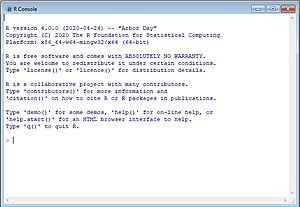Using this menu you can open the on-line manuals (R Help), read this FAQ and review the latest changes, bug fixes and new features of R for Mac OS X (What's new in this version). There are also interfaces to the R help and help.search functions as well as the example function. Click on the 'Download R for (Mac) OS X' link at the top of the page. Click on the file containing the latest version of R under 'Files.' Save the.pkg file, double-click it to open, and follow the installation instructions. Now that R is installed, you need to download and install RStudio. To Install RStudio.
When was the last time you update your R and RStudio?
I installed RStudio and R a year ago, and never update it since then. Today I just noticed I cannot install new R packages because of my old R version. So I explore some ways to update R and would like to share with someone who is also looking to update R on RStudio.

Downloads and installs Rtools. Allows the user to choose, downloads and install - the latest version of Rtools for Windows. By default, the function searches if RTools is installed, if not, it checks if it knows which version to isntall for the current R version, and if not - it asks the user to choose which Rtools version to install.
Adobe Reader Mac performs the same function as Windows version. Thus, it gives you the ability to open PDF files directly on the interface. It is easy to use and all you have to do is to import the file into the interface and it does the rest. This will start the updating process of your R installation by: “finding the latest R version, downloading it, running the installer, deleting the installation file, copy and updating old packages to the new R installation.” From within RStudio, go to Help Check for Updates to install newer version of RStudio (if available, optional).
The problem
RStudio and R cannot update on their own because some packages may not work after switching to the new version (You can still downgrade R version in RStudio if something went wrong though). After you install the new version, the previously installed packages will not go to next version. So it is required extra procedures to move the packages.
Here are 3 ways you can update R version in RStudio. Note that we need to move the install R packages, which I will show how at the end.
3 Solutions to update R on RStudio
Solution 1) Manually install (Recommended if you don't care about the old packages)
The first method is to download a new version of R from R website > CRAN. Then restart your RStudio. The new R version will be loaded automatically.
The new R version appear right after I install R and restart RStudio
Update 29/05/2019: For Mac users, solution 3 is too painful and not working well for me. This method is fast and working well. I would recommend to save your time from headache and use this method. Take note of your previous packages so you can install them again as needed.
Solution 2) Windows only – use installr
installr is the R package which helps install and update software.
R Latest Version For Macbook
The R code you will need for updating R is: (credit goes to Cara Wogsland for the code)
install.packages('installr')
library(installr)
updateR()
You can find the tutorial on how to use installr to update RStudio on R-Statistics website.
Solution 3) Mac only – use updateR
Similar to installr, updateR is the package to help updating R on Mac OS.
The R code you will need is these 5 lines: (credit goes to jroberayalas for the code)
install.packages('devtools') #assuming it is not already installed
library(devtools)
install_github('andreacirilloac/updateR')
library(updateR)
updateR(admin_password = 'Admin user password')
You can find in-depth tutorial on how to use updateR package on this blog.
How to move the previously installed R packages
This is the instructions for Mac OS user (who used solution 1 or 3 above). For Windows user, installr package will do this for you
(credit goes to RyanStochastic and micstr):
1. Move all folders from your old R version to new R version.
/Library/Frameworks/R.framework/Versions/x.xx/Resources/library
Replace x.xx with the old and new R version at a time.
Note that you have to move only the packages that are not currently in the destination folder (because those are the base packages, and you don’t want to ruin them). But if you already did replaced everything, the next step will solve this for you.
If you cannot find the proper path, you can run this command to check: installed.packages()
2. Update the moved packages
Run the following command in R. Type ‘y’ for every question that popped up.
update.packages(checkBuilt=TRUE)
3. Type the following command in R to check if everything went well

version
packageStatus()
That’s it! Hope you guys success in updating R. If not, please check in the reference link below.
References: https://stackoverflow.com/questions/13656699/update-r-using-rstudio
This directory contains binaries for a base distribution and packages to run on Mac OS X (release 10.6 and above). Mac OS 8.6 to 9.2 (and Mac OS X 10.1) are no longer supported but you can find the last supported release of R for these systems (which is R 1.7.1) here. Releases for old Mac OS X systems (through Mac OS X 10.5) and PowerPC Macs can be found in the old directory.
R Latest Version For Macbook Air
Note: CRAN does not have Mac OS X systems and cannot check these binaries for viruses.Although we take precautions when assembling binaries, please use the normal precautions with downloaded executables.
Package binaries for R versions older than 3.2.0 are only available from the CRAN archive so users of such versions should adjust the CRAN mirror setting (https://cran-archive.r-project.org) accordingly.
R 4.0.3 'Bunny-Wunnies Freak Out' released on 2020/10/10
Please check the MD5 checksum of the downloaded image to ensure that it has not been tampered with or corrupted during the mirroring process. For example type
openssl sha1 R-4.0.3.pkg
in the Terminal application to print the SHA1 checksum for the R-4.0.3.pkg image. On Mac OS X 10.7 and later you can also validate the signature using
pkgutil --check-signature R-4.0.3.pkg
Latest release:
| R-4.0.3.pkg (notarized and signed) SHA1-hash: 8402f586aef1fdb12c6e34c73b286f87318fb1be (ca. 85MB) | R 4.0.3 binary for macOS 10.13 (High Sierra) and higher, signed and notarized package. Contains R 4.0.3 framework, R.app GUI 1.73 in 64-bit for Intel Macs, Tcl/Tk 8.6.6 X11 libraries and Texinfo 6.7. The latter two components are optional and can be ommitted when choosing 'custom install', they are only needed if you want to use the tcltk R package or build package documentation from sources. Note: the use of X11 (including tcltk) requires XQuartz to be installed since it is no longer part of OS X. Always re-install XQuartz when upgrading your macOS to a new major version. Important: this release uses Xcode 10.1 and GNU Fortran 8.2. If you wish to compile R packages from sources, you will need to download and GNU Fortran 8.2 - see the tools directory. |
| NEWS (for Mac GUI) | News features and changes in the R.app Mac GUI |
| Mac-GUI-1.73.tar.gz SHA1-hash: 7f4b1d050757ce78545bdeb9d178a69d13046aa1 | Sources for the R.app GUI 1.73 for Mac OS X. This file is only needed if you want to join the development of the GUI, it is not intended for regular users. Read the INSTALL file for further instructions. |
Note: Previous R versions for El Capitan can be found in the el-capitan/base directory.Binaries for legacy OS X systems: | |
| R-3.6.3.nn.pkg (signed) SHA1-hash: c462c9b1f9b45d778f05b8d9aa25a9123b3557c4 (ca. 77MB) | R 3.6.3 binary for OS X 10.11 (El Capitan) and higher, signed package. Contains R 3.6.3 framework, R.app GUI 1.70 in 64-bit for Intel Macs, Tcl/Tk 8.6.6 X11 libraries and Texinfo 5.2. The latter two components are optional and can be ommitted when choosing 'custom install', they are only needed if you want to use the tcltk R package or build package documentation from sources. |
| R-3.3.3.pkg MD5-hash: 893ba010f303e666e19f86e4800f1fbf SHA1-hash: 5ae71b000b15805f95f38c08c45972d51ce3d027 (ca. 71MB) | R 3.3.3 binary for Mac OS X 10.9 (Mavericks) and higher, signed package. Contains R 3.3.3 framework, R.app GUI 1.69 in 64-bit for Intel Macs, Tcl/Tk 8.6.0 X11 libraries and Texinfo 5.2. The latter two components are optional and can be ommitted when choosing 'custom install', it is only needed if you want to use the tcltk R package or build package documentation from sources. Note: the use of X11 (including tcltk) requires XQuartz to be installed since it is no longer part of OS X. Always re-install XQuartz when upgrading your OS X to a new major version. |
| R-3.2.1-snowleopard.pkg MD5-hash: 58fe9d01314d9cb75ff80ccfb914fd65 SHA1-hash: be6e91db12bac22a324f0cb51c7efa9063ece0d0 (ca. 68MB) | R 3.2.1 legacy binary for Mac OS X 10.6 (Snow Leopard) - 10.8 (Mountain Lion), signed package. Contains R 3.2.1 framework, R.app GUI 1.66 in 64-bit for Intel Macs. This package contains the R framework, 64-bit GUI (R.app), Tcl/Tk 8.6.0 X11 libraries and Texinfop 5.2. GNU Fortran is NOT included (needed if you want to compile packages from sources that contain FORTRAN code) please see the tools directory. NOTE: the binary support for OS X before Mavericks is being phased out, we do not expect further releases! |
Subdirectories:
| tools | Additional tools necessary for building R for Mac OS X: Universal GNU Fortran compiler for Mac OS X (see R for Mac tools page for details). |
| base | Binaries of R builds for macOS 10.13 or higher (High Sierra) |
| contrib | Binaries of package builds for macOS 10.13 or higher (High Sierra) |
| el-capitan | Binaries of package builds for OS X 10.11 or higher (El Capitan build) |
| mavericks | Binaries of package builds for Mac OS X 10.9 or higher (Mavericks build) |
| old | Previously released R versions for Mac OS X |
You may also want to read the R FAQ and R for Mac OS X FAQ. For discussion of Mac-related topics and reporting Mac-specific bugs, please use the R-SIG-Mac mailing list.

Information, tools and most recent daily builds of the R GUI, R-patched and R-devel can be found at http://mac.R-project.org/. Please visit that page especially during beta stages to help us test the Mac OS X binaries before final release!
New Mac Version
Package maintainers should visit CRAN check summary page to see whether their package is compatible with the current build of R for Mac OS X.
Binary libraries for dependencies not present here are available from http://mac.R-project.org/libs and corresponding sources at http://mac.R-project.org/src.
Mac Os Versions List
Last modified: 2020/10/10, by Simon Urbanek
